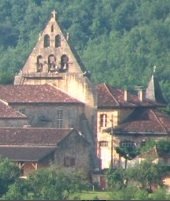We all have different ways of dealing with stress. When I was a lawyer, we all had one of those cushy little stress-balls in our desks – generally a freebie from one of the big financial printing companies – and we’d sit around squeezing the things and drinking coffee. Some people run. Some knit, play Sudoko, go on long walks. These days, when I’m stressed, I call Fabrice.
Fabrice is our odd-jobs guy. I’d say he looks the part, but he doesn’t really. Imagine a young guy from a tiny French village doing occasional jobs as a woodworker, builder or gardener, and I’m not really sure what you think of, but it’s not Fabrice. At first sight, he looks more the part of an urban junkie, someone who in a city you might expect to hit you up for some change. He’s rake thin, slight of frame, and about half his body mass is accounted for by the huge bundle of dreadlocks perched uncertainly above his kind, fine-featured face. If Tolkein’s elves listened to Bob Marley, the result would more than likely resemble Fabrice.
The youth of Montcabrier have a tendency, like the youth of most small rural communities, to leave home and seek their fortunes elsewhere. Some come and go. But Fabrice has stayed, and has no interest in leaving. The outside world is quite simply too crowded and fast-paced for his liking. So he lives here in a sort of parallel universe, staying alternately with friends, with his parents, or alone in his van. As far as I can tell, he is happy.
We had Fabrice around this week helping to clear up after another round of tree-cutting. He pulls up in his old car, dark gray but for one white fender, and climbs out. He opens the trunk, pulls out his chainsaw, a gas can, an old machete with a taped-up handle. He says a quiet bonjour, we discuss the weather, and then he gets to work.
I watch him for a few minutes cutting branches, methodically stacking logs, one by one, and it reminds of Buddhist monks going about their daily monastic chores. Is he contemplating God as he drags branches and packs them into the trailer? Is he practicing awareness meditation? Pondering Rousseau’s writings on the Noble Savage? I don’t know, but he gives off a sense of calm that is almost soporific. When he’s around, I find myself moving more slowly, speaking more softly. I feel reassured. I used to assume, based largely on his appearance, that he spent his free time smoking weed, but I’ve come to doubt that. Fabrice is a mind-altering substance in his own right.
He pauses, looks around, gathers strength and then swings his machete, separating another branch from a fallen tree. To talk to him you would hardly imagine that the world is in the grips of financial meltdown. He scrapes a living from odd-jobs like this, a bit of construction work, occasionally helping a friend who sells bric-a-brac at local markets in summer. It’s not that he’s lazy – he will carry heavy logs, dig, plant, chop down trees, haul branches all day long without ever appearing tired or uttering a word of complaint. And it’s certainly not that he’s unskilled. Over the years I’ve come to learn that he is an accomplished carpenter – he’s done some amazingly meticulous jobs for us, from building a bookcase to repairing a couple of antique chairs. He even makes traditional wooden rowing boats – I suppose that’s as close as he’s got to a hobby, although it’s hard to imagine him having much need to blow off steam. I once asked him if he sold any. Yes, he makes them to order, in theory at least. But given that his only attempt at marketing is a small wooden sign that reads “bateaux” nailed to a tree along a dead-end country lane, I’m not holding my breath. But then again, neither is he. All he’s after, as far as I can tell, is to live in peace in this quiet corner of France. One could do worse.
But these days I’m starting to see an ambitious twinkle in his eye. A new law in France has made it much easier for people to start their own small businesses and not have to pay enormous social charges, so Fabrice is thinking of setting himself up in a business building wooden houses. He has managed to buy a small plot of land of his own in the forest, reached by a dirt path. Not the choicest real estate, perhaps, but it’s perfect for him. He’s looking for good straight pine trees to cut down to use for building a little chalet. It won’t have electricity, and he’ll heat it with a wood-burning stove, but it will be his, and I would imagine it will suit him just fine.
Of course, my secret fear is that we'll lose our friendly, dependable and curiously enlightened odd-jobs man. He's settling down, building a house, thinking of starting a career. Joining the rat race. But I don't think that will change him. Fabrice will bring that sense of calm to whatever he does. In the meantime, he's very welcome to bring it here.

